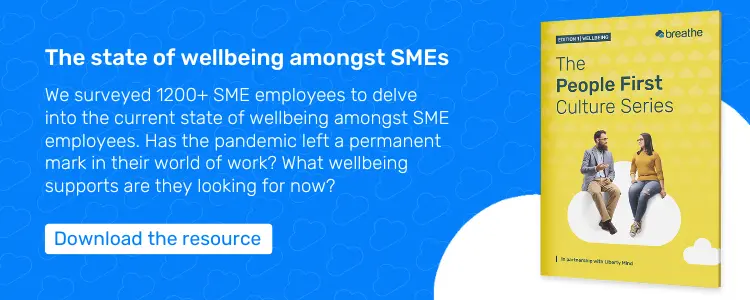Now, more than ever, many employees are fighting mental health conditions such as stress, anxiety & depression.
Recent data published by The Health and Safety Executive (HSE) revealed that there was an estimated 875,000 cases of work-related stress, depression or anxiety in 2022-23 - higher than pre-pandemic levels.
This is a crucial statistic for SME employers. It's important to know if your employees are struggling, especially if it's work-related.
This blog provides practical tips & advice for small businesses in supporting your employees' mental health.
Skip to:
-
How company culture links to mental health
-
5 ways you can support your employees' mental health
-
Pledge to change the stigma
-
Understand your people
-
Regularly check in & apply a measuring metric
-
Prioritising mental health in your SME - practical tips
-
Be the leader you needed
-
The wellbeing research SMEs need to read
How company culture links to mental health
At a time when many SMEs are struggling due to economic uncertainty, it's easy to see how cultural development may not seem like a business priority.
But we believe it absolutely should be - both for the sake of your people & your company.
Common mental health issues such as anxiety or depression can easily be exacerbated by a poor company culture, or stress - especially if it's work-related.
Research from our People First Culture Series, wellbeing edition, revealed that 47% of SME employees had reported suffering from stress in the survey period, with 12% taking sick leave as a result.
It's not news that stress takes a huge toll on mental health - and performance at work as a result.
How to support mental health at work
Creating a culture where your team have psychological safety, can share when they're struggling & feel able to seek support is now more important than ever.
Trusting an employer to do the right thing and handle issues in a responsible way is key to building trust and reducing fears which could be contributing to poor mental health.
5 ways you can support your employees' mental health at work:
-
Pledge to support mental health initiatives
-
Understand your people
-
Regularly check in to see how your team are doing
-
Use resources from a mental health toolkit
-
Lead by example
1. Pledge to change the stigma
Your first step is to make the most of online help and guidance and sign up to an industry-recognised support service. Charities like Mind provide invaluable guidance to mental health sufferers & those who support them.
In partnership with Re-think Mental Illness & the Co-op, Mind has created 'Time to Talk Day', where they hope to start important conversations about mental health, nationwide.
Through pledging your commitment, you're creating the foundations for a safe, stigma-free environment, where your employees understand that you believe their health & wellbeing matters.
By committing to take mental health conditions such as anxiety, stress and workplace depression seriously, you'll encourage respect and improve trust from your employees.
2. Understand your people
Great business starts on the inside and it's your people who are fundamental to everyday working and growth. The healthier your team are, the healthier the business is. But can you honestly say that you can spot the signs of depression in the workplace?
It all starts with understanding your people. Create a safe environment and take the time to get to know your employees and you’ll become more aware of shifts in mood or behaviour - you'll know what's normal for your team.
Use HR software to keep track of absence patterns and one-to-one notes and you’ll have an accessible source of information to support your observations.
3. Regularly check in & apply a measuring metric
Don't underestimate the value of an impromptu check-in. For team members who you suspect may struggle, or who have diagnosed conditions, agree to commit to a clear risk assessment system. This helps quickly identify your feelings and potential stressors as well as healthy behaviours you can adopt when the going gets especially tough.
You could use a scale of 1-10, where you clearly identify what each number means. Or, you could use a traffic light system - e.g. green for good, amber for okay or needs a chat, and red for urgently needs help.
Essentially, what we're saying is check in with your team so they feel listened to - and
offer as much support as you can to avoid their traffic lights turning red.And this burden isn't all on HR or line managers, either - lots of businesses offer resources and help for those struggling with their mental health, such as Employee Assistance Programmes, or Mental Health First Aiders. Breathe's Learn module offers a mental health training course.
Breathe's burnout monitor can flag to HR who might be at risk of burnout from not taking enough leave, or not taking holiday for a long time (and allowing you to nudge them to take some time off).
Sometimes it can simply be a case of actively listening to an employee in a one-to-one, and pointing them in the right direction for additional support, for example.
The traffic light system is a helpful and easy-to-use tool to help you and your team members stay aware of one another’s mental health so you can act if needed.
4. Practical tips to prioritise mental health
Aim to prevent periods of unnecessary stress by providing support before an issue arises. Here are some tips for your SME to use to put employees' mental health first:
-
Employee surveys
Start with an anonymous employee wellbeing & happiness survey. This will help benchmark current feelings and attitudes to work, as well as highlight red flags and areas that require more attention or support.
This gives SMEs a clear action plan & way forward. Even the best cultures might need improvements in some areas, after all.
-
Room for headspace
If your space allows, provide a room or an area that encourages headspace or downtime. At Breathe, we have the option to participate in monthly learning days to upskill & dedicate to training. This could also look like flexible working, or allowing people focus time whilst working at home.
If not, encourage your people to take regular breaks away from their screens. Stretch those legs, get some fresh air and be present in nature. Not only will your team thank you, but they'll be more likely to experience better mental health - as well as being more focussed and productive afterwards, too.
This could also look like meeting-free days to allow actual time to focus on work without being bombarded/distracted by countless meetings.
-
Encourage your team to get creative
Jigsaw puzzles, activity and adult colouring books, inspirational stories, magazines and quote-inspired to-do-lists aren't just child's play. In fact, research shows that for the majority of mental health conditions, providing a creative outlet is extremely powerful for positively influencing focus & providing calm.
Breathe's People team have previously run painting sessions on World Kindness Day, as well as inviting team Breathe to paint musical instruments during lunch breaks (which were then donated to Chestnut Tree House, the children's hospice charity). Feedback from the team was that these activities were therapeutic, calming & improved focus afterwards - a win-win all round.
-
Mental Health First Aid training
Mental Health First Aid (MHFA) in the workplace training is a fundamental investment into the health and wellbeing of your team and company. Commit to helping your managers help your people and let the experts educate your team on how to spot the signs in the workplace, as well as tools for support.
Remember to tell (and regularly remind) your team who's a trained Mental Health First Aider, so they'll know who to turn to for extra guidance.
5. Be the leader you needed
Just as you may have had a favourite teacher, you’ve hopefully had at least one key figure who inspired and developed you like no other.
Be the leader you needed when you first started work. And take a minute to think about what that may look like.
Here are the things we believe make a difference:
-
Listening and engaging.
-
Practicing prioritisation, compassion & patience.
-
Committing to regular one-to-ones and encouraging other leaders to do the same.
-
Asking yourself: How can I make a positive difference to my team? And asking them for feedback.
-
Sharing what you've learnt from testing experiences with your team. Be sure to demonstrate how perseverance and resilience helped you triumph. Remember, vulnerability makes you human.
Please note - just like the rest of this blog- this isn't an exhaustive list, but a springboard for how SMEs can start making positive changes.
The wellbeing research SMEs need to read
Mental health support for employees is a huge topic, with enormous depth.
If you're looking for more information on mental health, organisational culture & what you can do as an employer, just head over to our Culture hub.
For insightful research & practical tips for SMEs on supporting your employees' wellbeing, download the first edition of our People First Culture Series for free.

Author: Aimée Brougham-Chandler
An IDM-certified Digital Copywriter (2023) & English Language & Literature graduate (BA Hons), Aimée is Breathe's Content Assistant. With 3 years' content marketing experience, Aimée has a passion for writing - and providing SME HR teams with solutions to their problems. She enjoys delving into & demystifying all things HR: from employee performance to health and wellbeing, leave to company culture & much more.








